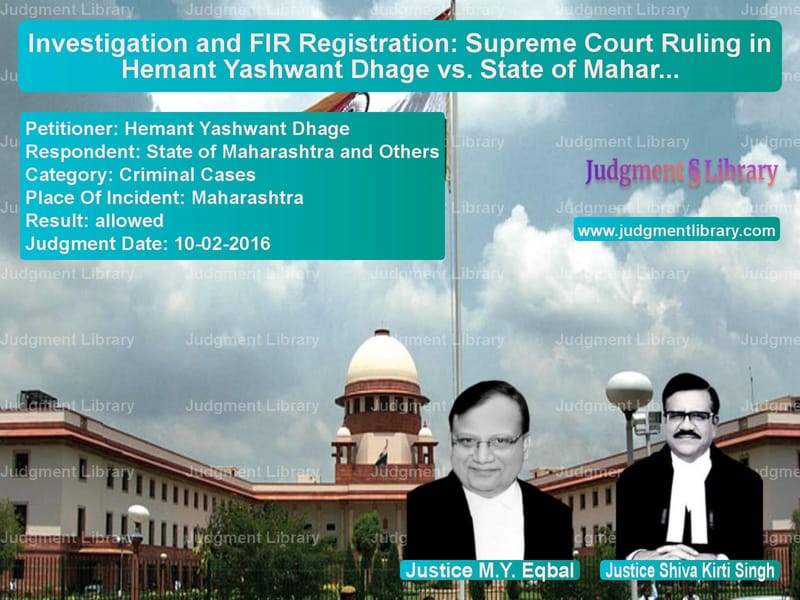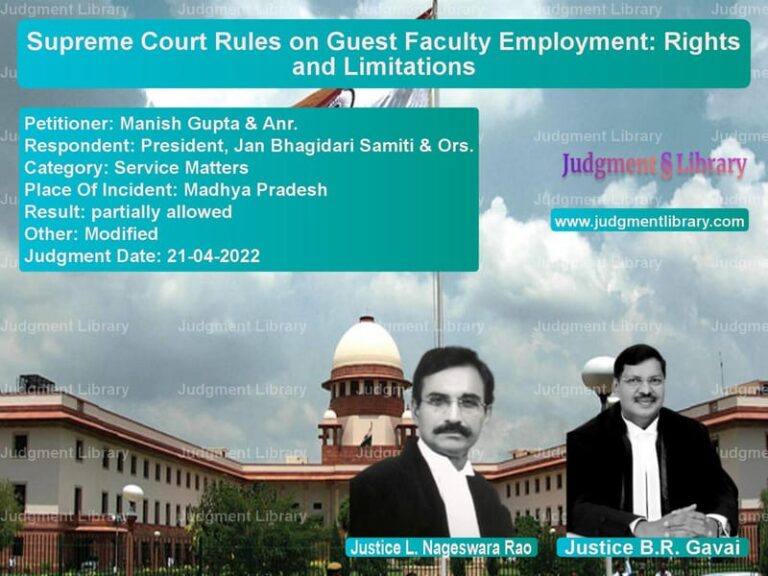Investigation and FIR Registration: Supreme Court Ruling in Hemant Yashwant Dhage vs. State of Maharashtra
The case of Hemant Yashwant Dhage vs. State of Maharashtra deals with a significant issue in criminal law regarding the registration of an FIR and the powers of the Magistrate under Section 156(3) CrPC. The Supreme Court had to clarify whether an investigation could proceed without a formal FIR and directed the concerned authorities to rectify procedural lapses.
Background of the Case
The case arose from Criminal Appeals No. 766 and 767 of 2010, which were filed in response to a judgment by the Bombay High Court. The appellant, Hemant Yashwant Dhage, was the complainant in a matter where he sought a proper investigation into serious allegations.
The High Court had earlier entertained a writ petition regarding the change of investigating officer, a decision which was later challenged before the Supreme Court. The apex court set aside the High Court’s ruling on April 12, 2010, directing the complainant to approach the Magistrate under Section 156(3) CrPC, which allows a Magistrate to direct police authorities to ensure proper investigation.
Legal Issue Before the Supreme Court
The primary issue before the Supreme Court was:
- Whether the Magistrate was correct in refusing to direct the police to register an FIR despite an order from the Supreme Court?
- Whether the police could continue an investigation without formally registering an FIR?
- What directions should be issued to rectify procedural lapses?
Arguments Presented
Appellant’s Arguments
Senior advocate Ram Jethmalani, appearing for the appellant, made the following points:
- The investigation into a serious criminal case had been delayed due to procedural errors.
- The police should be directed to treat the case as a police case under Section 156(3) CrPC.
- There should be no further delay, and the police should complete their investigation within six months and submit a final report to the Magistrate.
Respondents’ Arguments
Senior counsel P. Chidambaram, representing the private respondents, did not object to the appellant’s plea. He suggested:
- The police should conduct a thorough investigation without wasting time on procedural formalities.
- The final report should be submitted as soon as possible.
Senior counsel Arvind Sawant, representing the State of Maharashtra, also agreed that the police should submit their final report at the earliest.
Supreme Court’s Analysis
The Supreme Court examined its previous ruling and noted a fundamental error in the way the Magistrate and police had proceeded. It referred to the case of Mohd. Yousuf vs. Afaq Jahan (2006) 1 SCC 627, which clearly stated:
- Registration of an FIR is a procedural step where the police record the substance of the information related to a cognizable offense.
- Even if a Magistrate does not explicitly direct the registration of an FIR, an order under Section 156(3) CrPC automatically mandates the police to register an FIR.
- Since Section 156(3) CrPC is part of Chapter XII of the CrPC, which governs police investigation powers, an FIR must be registered before any further steps are taken.
Supreme Court’s Ruling
The Supreme Court found that the Magistrate erred in refusing to direct the registration of an FIR. The Court ruled:
- The police and the Magistrate must rectify their mistake and register an FIR immediately.
- The delay in registering the FIR after April 12, 2010, should not affect the investigation.
- The police must complete the investigation within six months and submit a final report.
- The Magistrate must decide the matter strictly based on law, without being influenced by previous orders.
Key Takeaways from the Judgment
This case establishes crucial legal principles regarding criminal investigations:
- Once a Magistrate orders an investigation under Section 156(3) CrPC, the police must register an FIR.
- Delays in FIR registration should not hinder the investigation.
- The role of the Magistrate is to ensure that investigations are conducted properly, but they cannot conduct the investigation themselves.
- The police are responsible for submitting a final report to the Magistrate, who then decides on the next steps.
Conclusion
The Supreme Court’s decision in Hemant Yashwant Dhage vs. State of Maharashtra clarifies the legal procedure regarding FIR registration and police investigations. By directing the authorities to rectify their procedural lapses, the Court ensured that justice would not be delayed due to technical errors. This judgment serves as an important precedent for cases involving delays in police investigations and the powers of Magistrates under Section 156(3) CrPC.
Don’t miss out on the full details! Download the complete judgment in PDF format below and gain valuable insights instantly!
Download Judgment: Hemant Yashwant Dhag vs State of Maharashtra Supreme Court of India Judgment Dated 10-02-2016-1741852584328.pdf
Direct Downlaod Judgment: Direct downlaod this Judgment
See all petitions in Bail and Anticipatory Bail
See all petitions in Fraud and Forgery
See all petitions in Attempt to Murder Cases
See all petitions in Judgment by M.Y. Eqbal
See all petitions in Judgment by Shiva Kirti Singh
See all petitions in allowed
See all petitions in supreme court of India judgments February 2016
See all petitions in 2016 judgments
See all posts in Criminal Cases Category
See all allowed petitions in Criminal Cases Category
See all Dismissed petitions in Criminal Cases Category
See all partially allowed petitions in Criminal Cases Category







